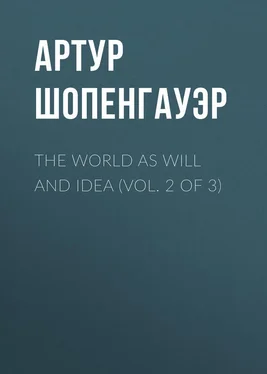Bayard Taylor's translation of “Faust,” vol. i. p. 14. – Trs.
“Faust,” scene vi., Bayard Taylor's translation, vol. i. p. 134. – Trs.
Observe here that I always quote the “Kritik der reinen Vernunft” according to the paging of the first edition, for in Rosenkranz's edition of Kant's collected works this paging is always given in addition. Besides this, I add the paging of the fifth edition, preceded by a V.; all the other editions, from the second onwards, are the same as the fifth, and so also is their paging.
Cf. Christian Wolf's “ Vernünftige Gedanken von Gott, Welt und Seele ,” § 577-579. It is strange that he only explains as contingent what is necessary according to the principle of sufficient reason of becoming, i. e. , what takes place from causes, and on the contrary recognises as necessary that which is so according to the other forms of the principle of sufficient reason; for example, what follows from the essentia (definition), thus analytical judgments, and further also mathematical truths. The reason he assigns for this is, that only the law of causality gives infinite series, while the other kinds of grounds give only finite series. Yet this is by no means the case with the forms of the principle of sufficient reason in pure space and time, but only holds good of the logical ground of knowledge; but he held mathematical necessity to be such also. Compare the essay on the principle of sufficient reason, § 50.
With my refutation of the Kantian proof may be compared the earlier attacks upon it by Feder, Ueber Zeit, Raum und Kausalität , § 28; and by G. E. Schulze, Kritik der theoretischen Philosophie , Bd. ii. S. 422-442.
See Sext. Empir. Pyrrhon. hypotyp. , lib. i. c. 13, νοουμενα φαινομενοις αντετιθη Αναξαγορας (intelligibilia apparentibus opposuit Anaxagoras).
That the assumption of a limit of the world in time is certainly not a necessary thought of the reason may be also proved historically, for the Hindus teach nothing of the kind, even in the religion of the people, much less in the Vedas, but try to express mythologically by means of monstrous chronology the infinity of this phenomenal world, this fleeting and baseless web of Mâyâ, for they at once bring out very ingeniously the relativity of all periods of time in the following mythus (Polier, Mythologie des Indous , vol. ii. p. 585). The four ages, in the last of which we live, embrace together 4,320,000 years. Each day of the creating Brahma has 1000 such periods of four ages, and his nights have also 1000. His year has 365 days and as many nights. He lives 100 of his years, always creating; and if he dies, at once a new Brahma is born, and so on from eternity to eternity. The same relativity of time is also expressed in the special myth which is quoted in Polier's work, vol. ii. p. 594, from the Puranas. In it a Rajah, after a visit of a few seconds to Vishnu in his heaven, finds on his return to earth that several millions of years have elapsed, and a new age has begun; for every day of Vishnu is 100 recurrences of the four ages.












